1、容器提供的類型
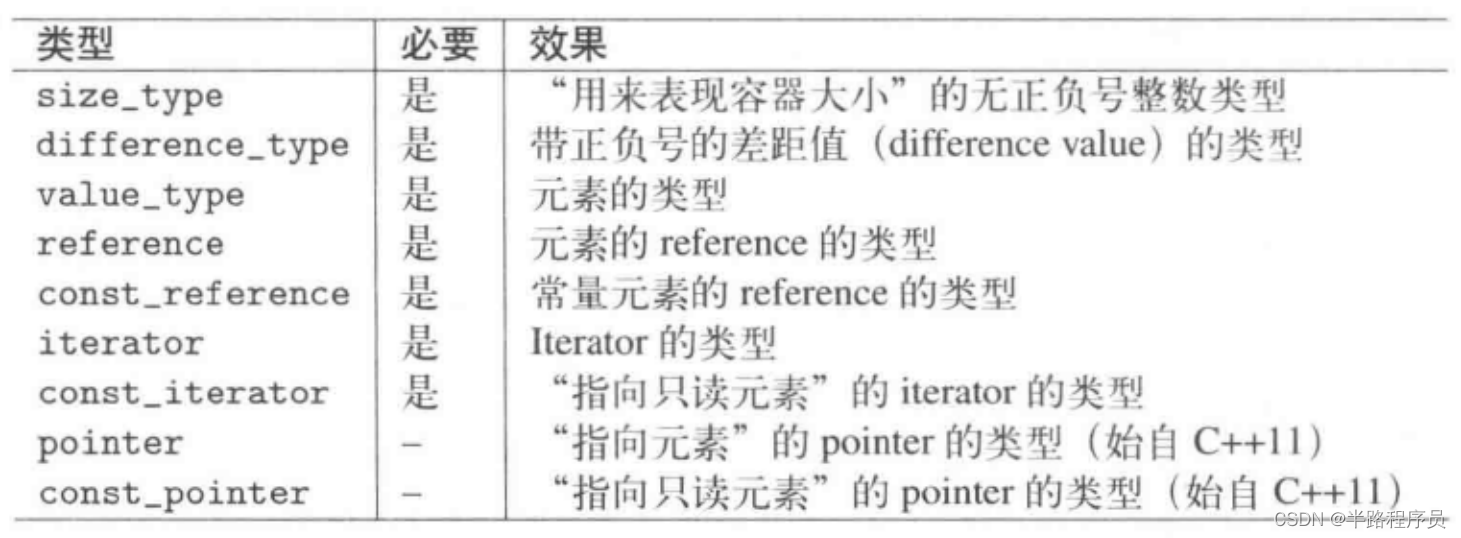
2、Array
Array大小固定,只允許替換元素的值,不能增加或者移除元素改變大小。Array是一種有序集合,支持隨機訪問。
std::array<int, 4> x; //elements of x have undefined value
std::array<int, 5> x = {}; // ok,all elements of x have value 0(int())
std::array<iny, 5> x = {1, 2, 3, 4, 5};
std::array<int, 5> x = {32} //one element with value 32, followed by 4 elements with value 0由于沒有提供針對初值列而寫的構造函數或者assignment操作符,因此在array聲明期間完成初始化是使用初值列的唯一途徑,基于這個原因,無法使用小括號語法指明初值,此不同于其他容器。
std::array<int, 5> a({1, 2, 3, 4, 5}); //error
std::vector<int> v({1, 2, 3, 4, 5}); //ok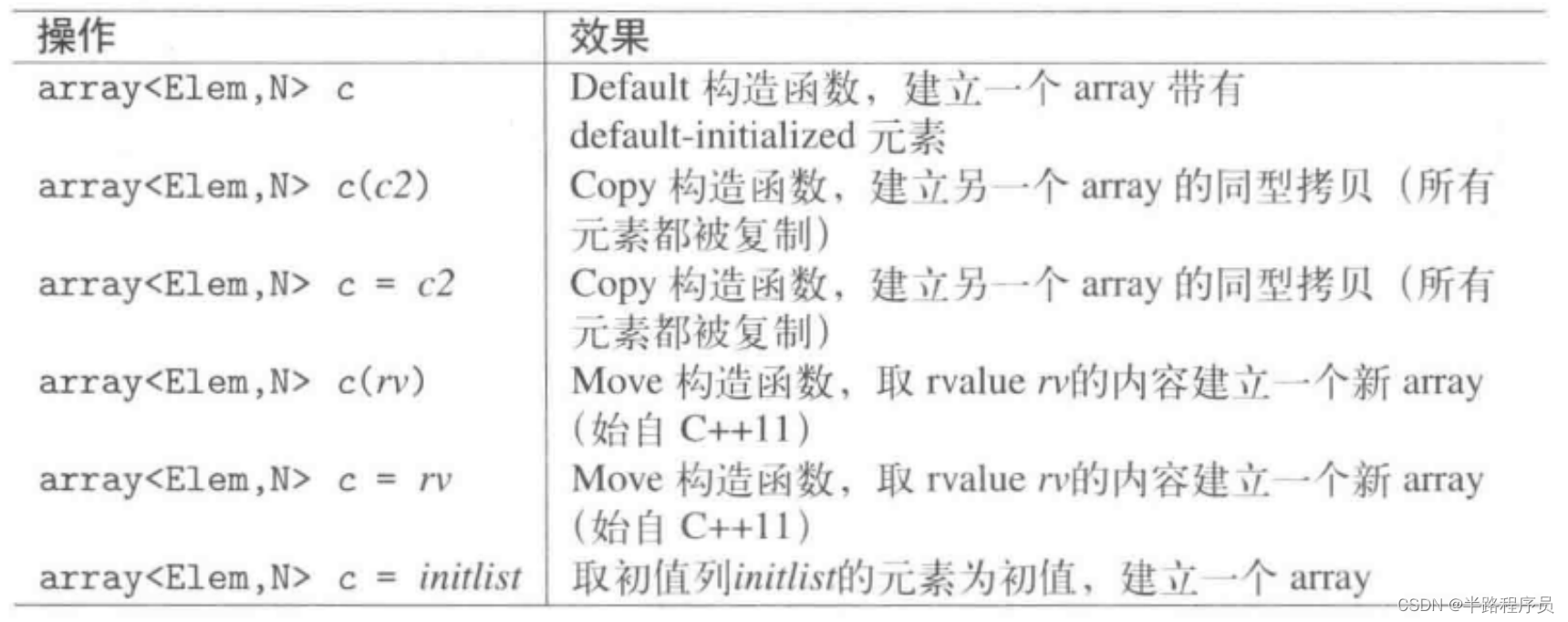
?賦值操作:

?2、tuple接口
Array提供tuple接口,使用如下:
typedef std::array<std::string, 5> FiveStrings;
FiveStrings a = {"hello", "nico", "how", "are", "you"};
std::tuple_size<FiveStrings>::value; //yield 5
std::tuple_element<1, FiveStrings>::type; //yield std::string
std::get<1>(a); //yield std::string("nico");3、vector
std::vector<int> v(50); //或調用默認構造函數
std::vector<int> v;
v.reserve(5); //不調用默認構造函數
所以上述兩種方法,在構造復雜對象時,性能是不一樣的?vector的reserve不能夠縮小容量大小,這一點和String不同。
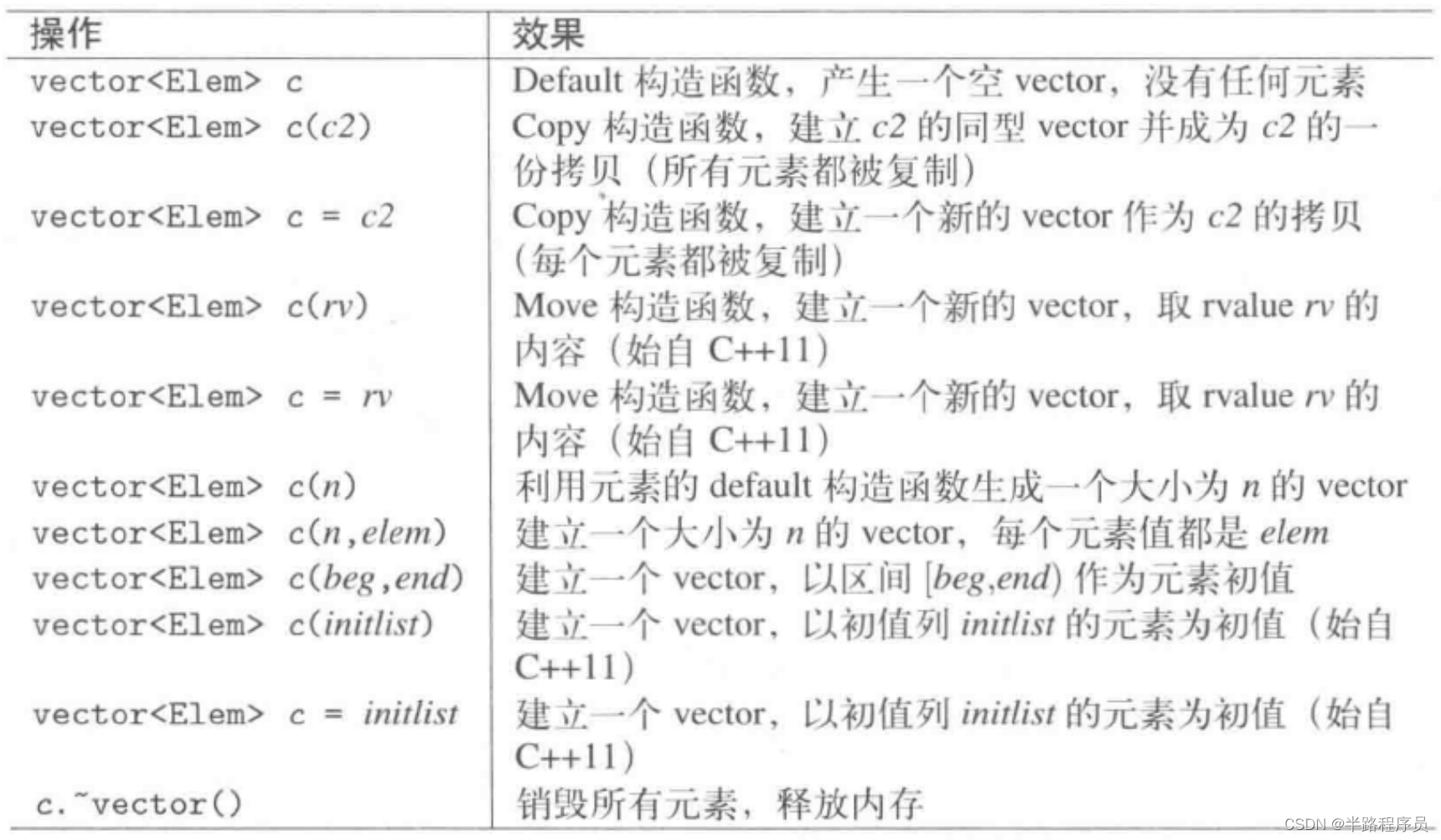 ?賦值操作
?賦值操作
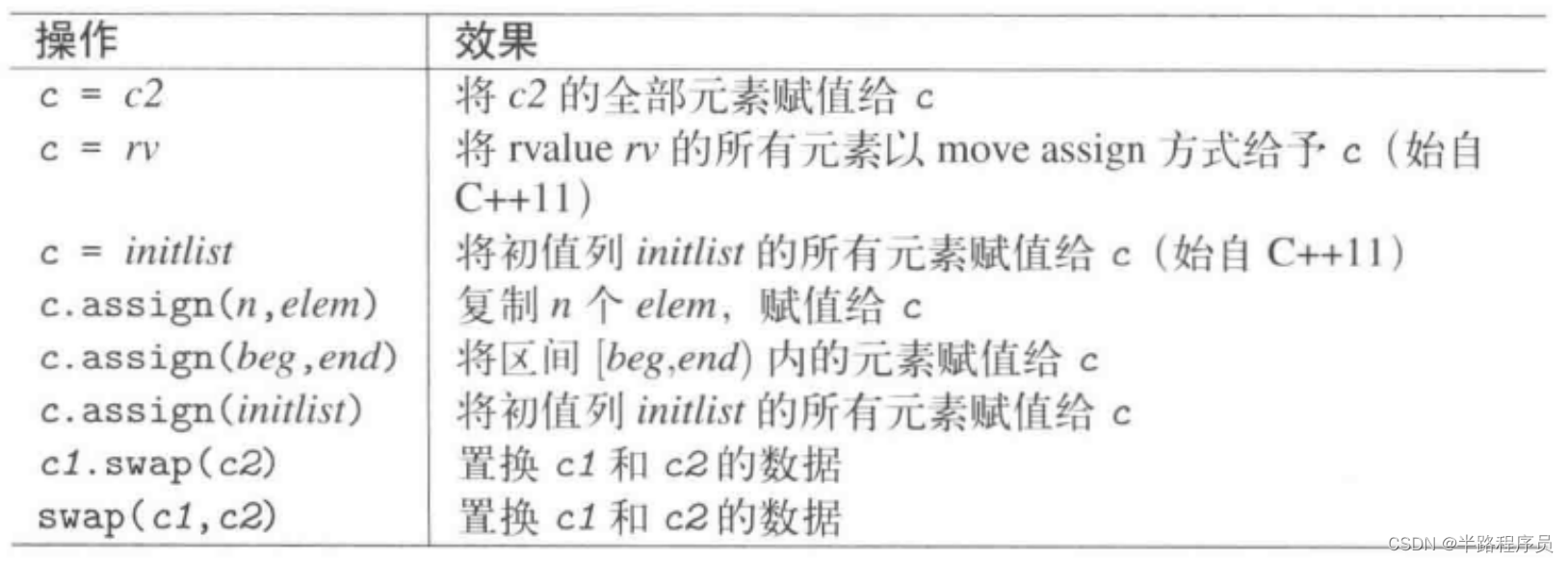
?插入和刪除
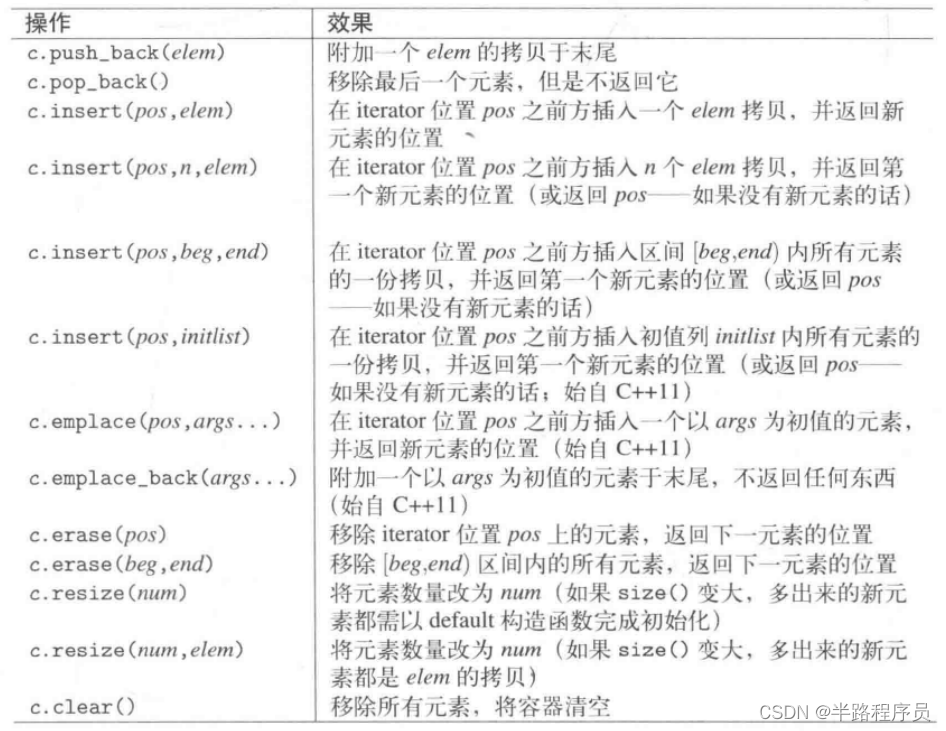
printf("%s\n", v.begin()); //ERROR
printf("%s\n", v.data()); //OK, since C++11
printf("%s\n", &v[0]); //ok, v.data() bettervector<bool>特殊操作:

?4、deque
?構造和析構函數

?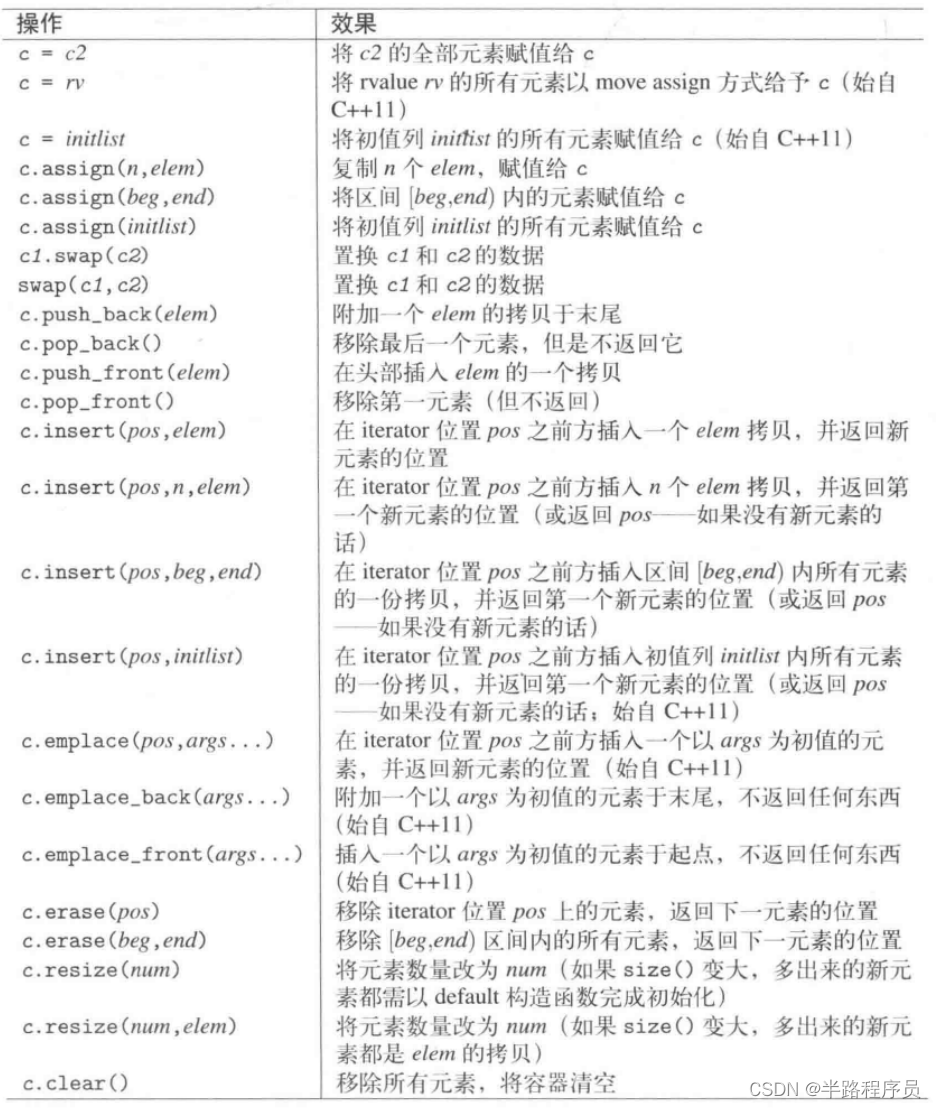
?5、List

構造和析構函數
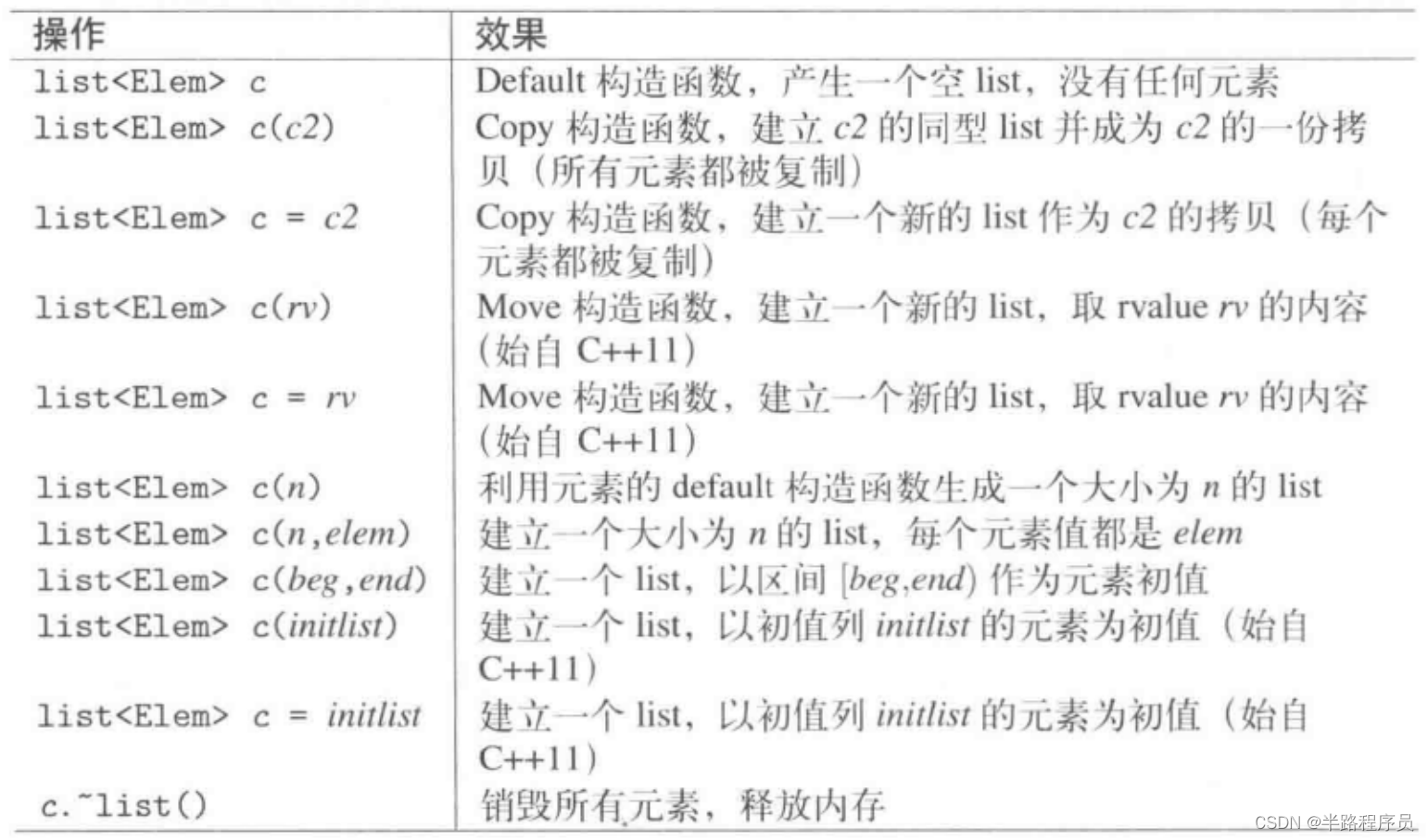
?賦值操作:

int main() {list<int> coll = {1, 2, 3, 4, 5, 4, 7, 4, 9};for (auto it = coll.cbegin(); it != coll.cend(); it++) {std::cout << *it << " ";}std::cout << std::endl;// 下面的remove會移除所有的4// coll.remove(4);// 如果只需要移除第一個4std::list<int>::iterator pos;pos = find(coll.begin(), coll.end(), 4);if (pos != coll.end()) {coll.erase(pos);}for (auto it = coll.cbegin(); it != coll.cend(); it++) {std::cout << *it << " ";}return 0;
}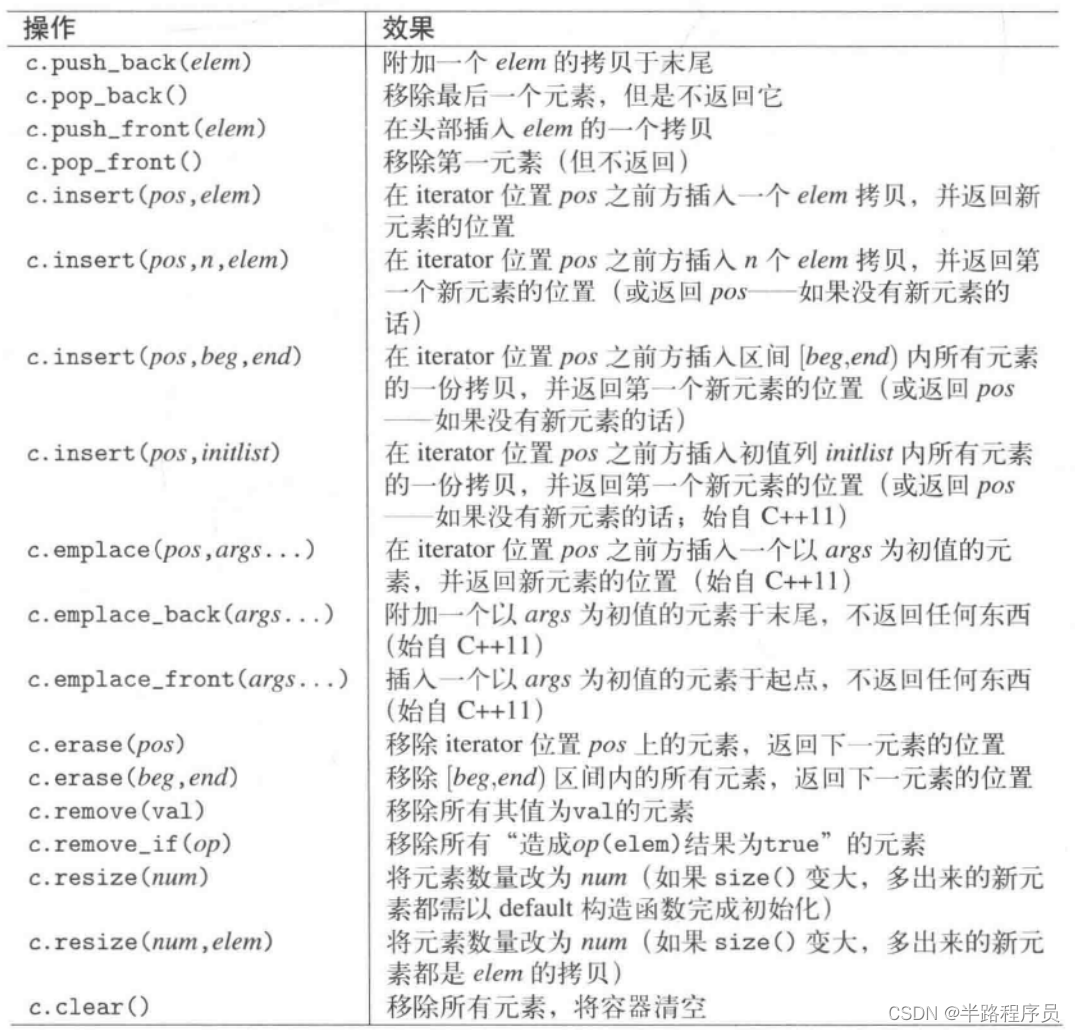
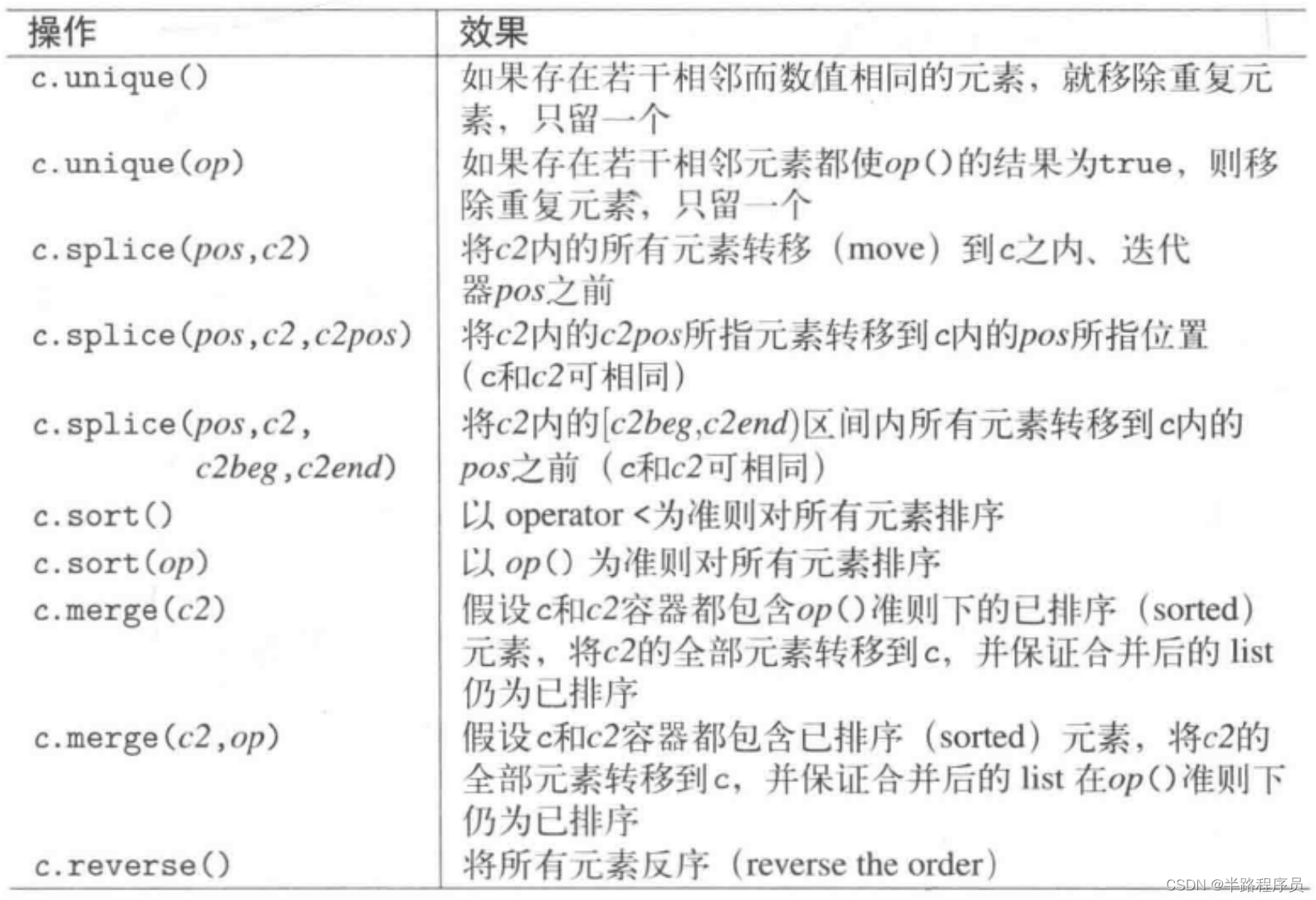
#include <list>
#include <iostream>
#include <algorithm>
#include <iterator>
using namespace std;void printLists (const list<int>& l1, const list<int>& l2)
{cout << "list1: ";copy (l1.cbegin(), l1.cend(), ostream_iterator<int>(cout," "));cout << endl << "list2: ";copy (l2.cbegin(), l2.cend(), ostream_iterator<int>(cout," "));cout << endl << endl;
}int main()
{// create two empty listslist<int> list1, list2;// fill both lists with elementsfor (int i=0; i<6; ++i) {list1.push_back(i);list2.push_front(i);}printLists(list1, list2);// insert all elements of list1 before the first element with value 3 of list2// - find() returns an iterator to the first element with value 3list2.splice(find(list2.begin(),list2.end(), // destination position3),list1); // source listprintLists(list1, list2);// move first element of list2 to the endlist2.splice(list2.end(), // destination positionlist2, // source listlist2.begin()); // source positionprintLists(list1, list2);// sort second list, assign to list1 and remove duplicateslist2.sort();list1 = list2;list2.unique();printLists(list1, list2);// merge both sorted lists into the first listlist1.merge(list2);printLists(list1, list2);
}
輸出:
list1: 0 1 2 3 4 5
list2: 5 4 3 2 1 0list1:
list2: 5 4 0 1 2 3 4 5 3 2 1 0list1:
list2: 4 0 1 2 3 4 5 3 2 1 0 5list1: 0 0 1 1 2 2 3 3 4 4 5 5
list2: 0 1 2 3 4 5list1: 0 0 0 1 1 1 2 2 2 3 3 3 4 4 4 5 5 5
list2:6、forward_list
?構造和初始化
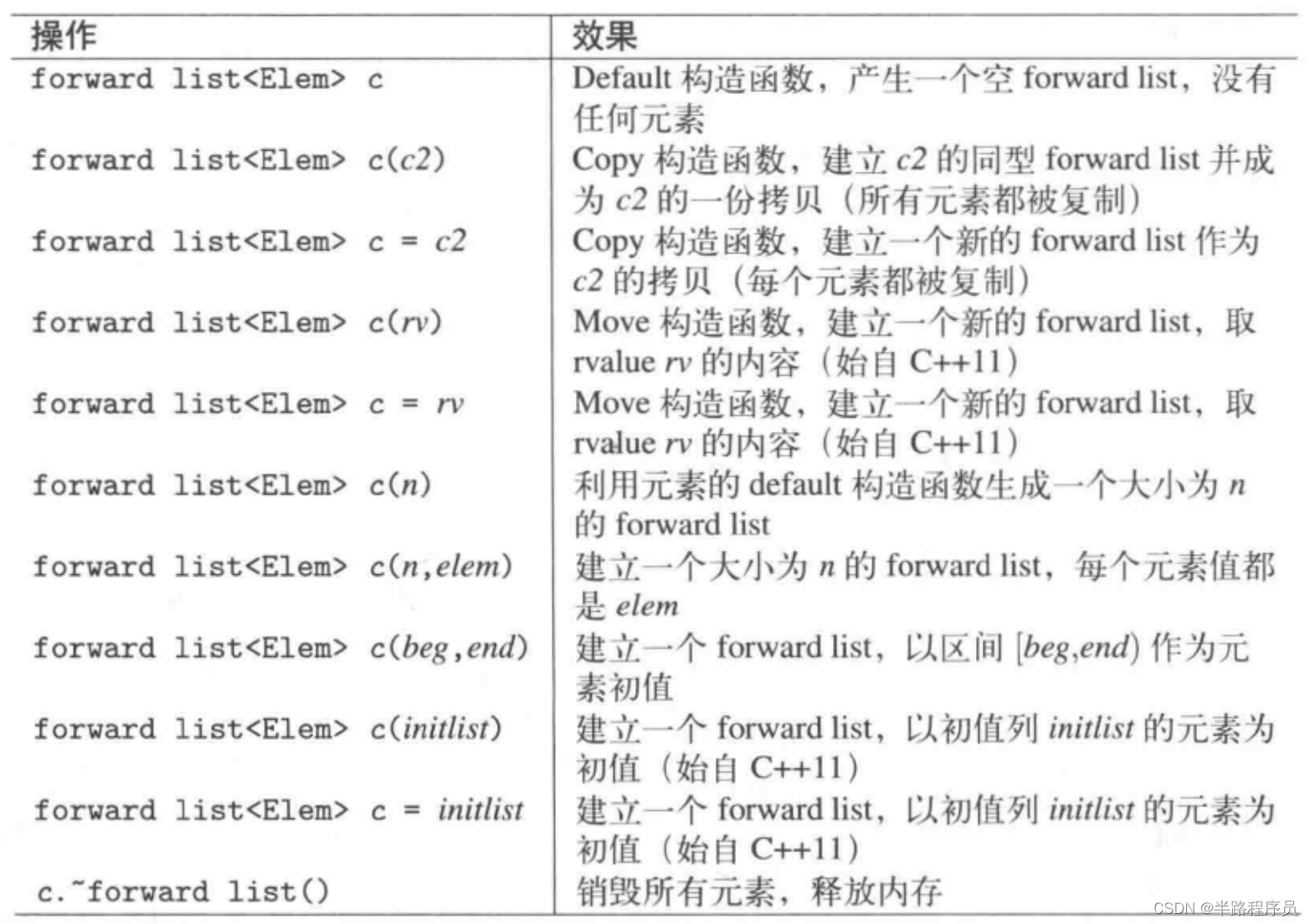
?賦值

?插入和刪除
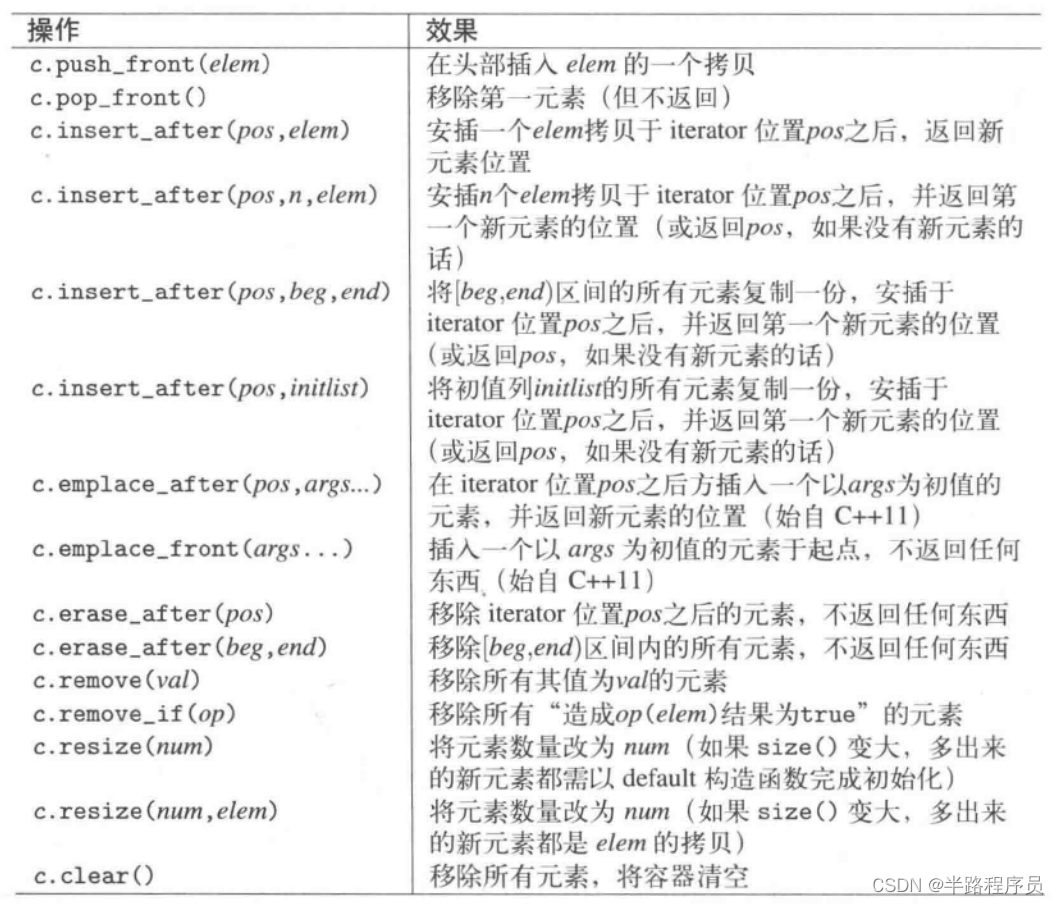
?
#include <iterator>
auto posBefore = list.before_begin();
for (; next(posBefore) != list.end(); ++posBefore) {if (*next(posBefore) % 2 == 0) {break;}
}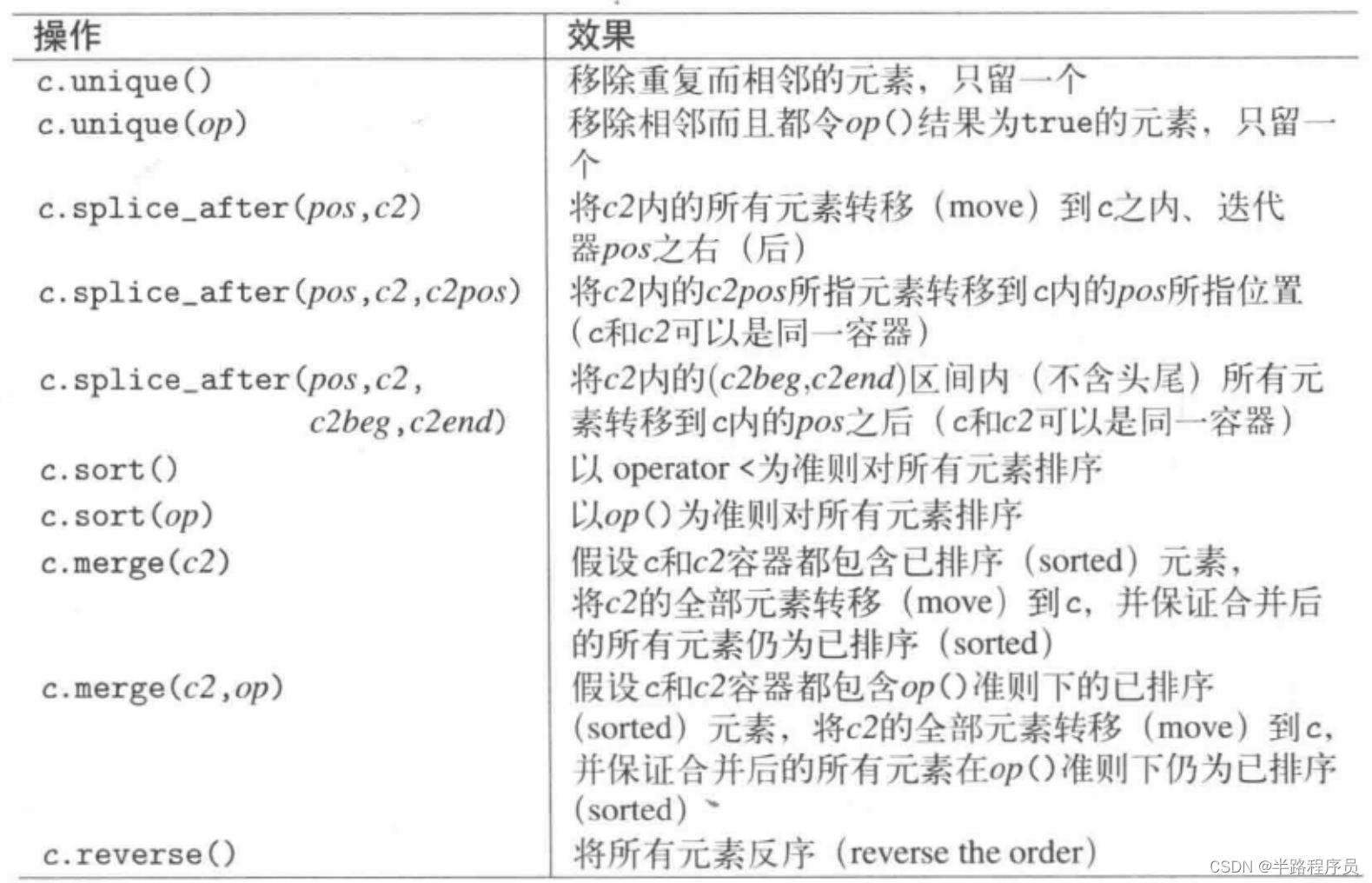
?splice_after操作

l1.splice_after(l2.find_before(99), l2, //destinationl1.find_before(3)); //source
#include <forward_list>
#include <iostream>
#include <algorithm>
#include <iterator>
#include <string>
using namespace std;void printLists (const string& s, const forward_list<int>& l1,const forward_list<int>& l2)
{cout << s << endl;cout << " list1: ";copy (l1.cbegin(), l1.cend(), ostream_iterator<int>(cout," "));cout << endl << " list2: ";copy (l2.cbegin(), l2.cend(), ostream_iterator<int>(cout," "));cout << endl;
}int main()
{// create two forward listsforward_list<int> list1 = { 1, 2, 3, 4 };forward_list<int> list2 = { 77, 88, 99 };printLists ("initial:", list1, list2);// insert six new element at the beginning of list2list2.insert_after(list2.before_begin(),99); // 開頭插入99list2.push_front(10); // 開頭插入10list2.insert_after(list2.before_begin(), {10,11,12,13} ); // 開頭插入10 11 12 13printLists ("6 new elems:", list1, list2);// insert all elements of list2 at the beginning of list1list1.insert_after(list1.before_begin(), // 把list2 插入到list1的最前面list2.begin(),list2.end());printLists ("list2 into list1:", list1, list2);// delete second element and elements after element with value 99list2.erase_after(list2.begin()); // 刪除第二個元素list2.erase_after(find(list2.begin(),list2.end(), // 刪除99之后的99),list2.end());printLists ("delete 2nd and after 99:", list1, list2);// sort list1, assign it to list2, and remove duplicateslist1.sort();list2 = list1;list2.unique(); // 排序之后去重printLists ("sorted and unique:", list1, list2);// merge both sorted lists into list1list1.merge(list2);printLists ("merged:", list1, list2);
}
輸出:
initial:list1: 1 2 3 4 list2: 77 88 99
6 new elems:list1: 1 2 3 4list2: 10 11 12 13 10 99 77 88 99
list2 into list1:list1: 10 11 12 13 10 99 77 88 99 1 2 3 4list2: 10 11 12 13 10 99 77 88 99
delete 2nd and after 99:list1: 10 11 12 13 10 99 77 88 99 1 2 3 4list2: 10 12 13 10 99
sorted and unique:list1: 1 2 3 4 10 10 11 12 13 77 88 99 99list2: 1 2 3 4 10 11 12 13 77 88 99
merged:list1: 1 1 2 2 3 3 4 4 10 10 10 11 11 12 12 13 13 77 77 88 88 99 99 99list2:7、set和multiset
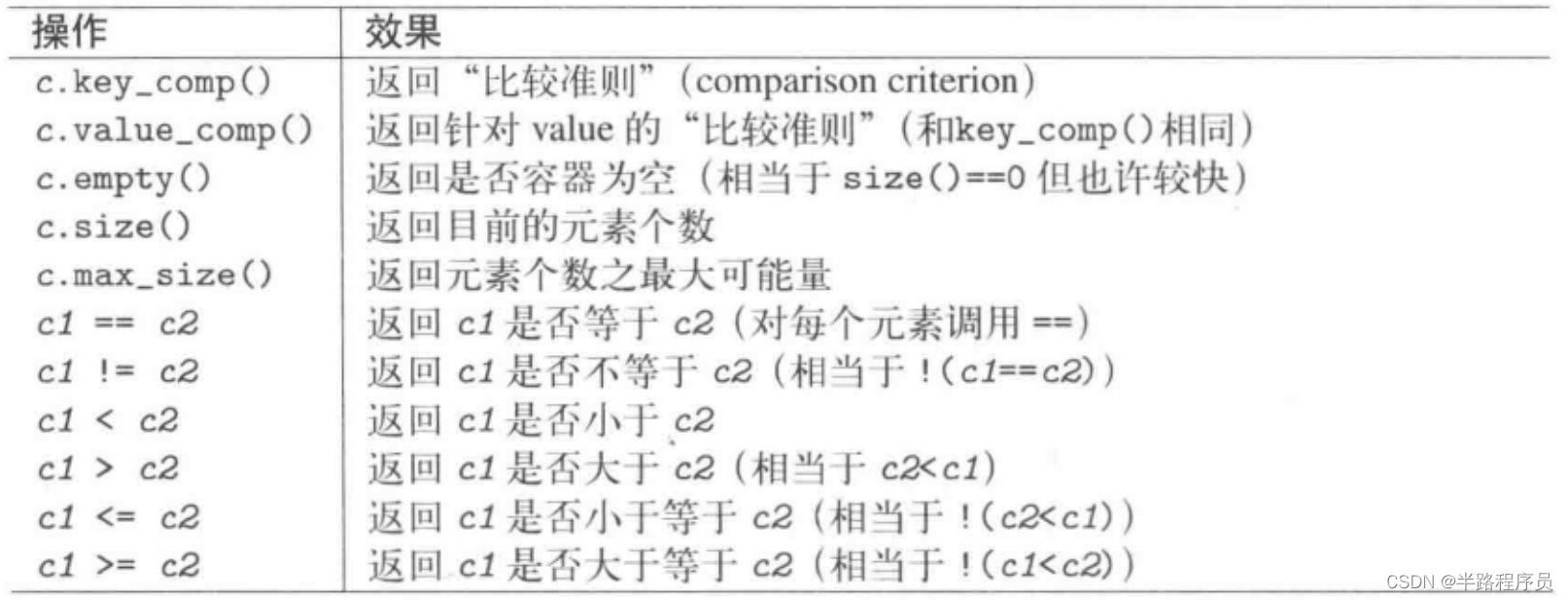

?插入和刪除
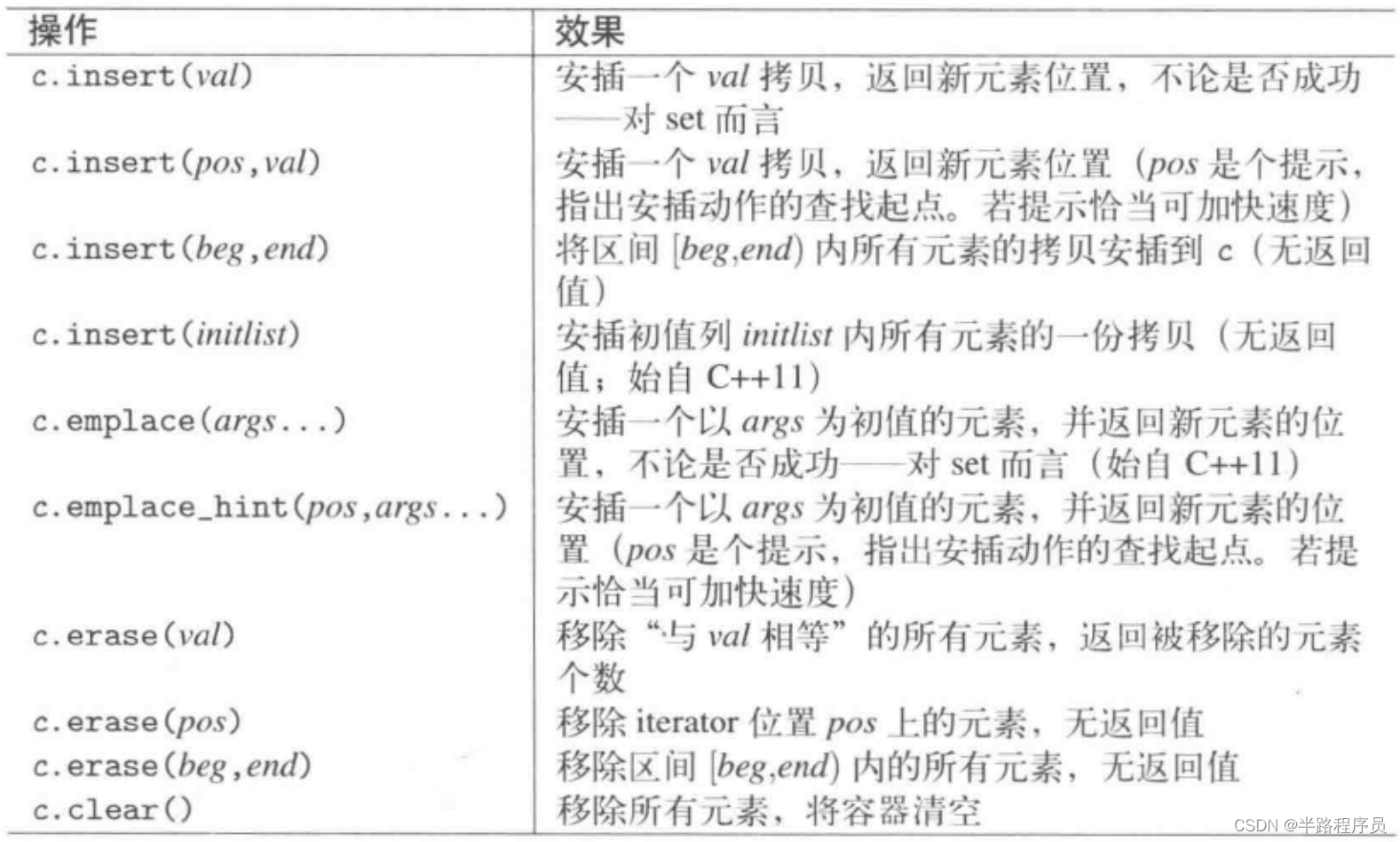
?set提供接口如下
pair<iterator, bool> insert(const value_type& val);
iterator insert(const_iterator posHint, const value_type &val);template<typename ... Args>
pair<iterator, bool> emplace(Args&& ... args);
template <typename ...Args>
iterator emplace_hint(const_iterator posHint, Args&&... args);multiset接口
iterator insert(const value_type& val);
iterator insert(const_iterator posHint, const value_type& val);template <typename... Args>
iterator emplace(Args&&... args);template <typename... Args>
iterator emplace_hint(const_iterator posHint, Args&& ... args);返回類型不同是因為multiset允許元素重復,而set不允許,將元素插入set內,如果已經有該元素,插入將失敗,返回類型是pair
pair中的second成員表示是否安插成功,first成員表示新元素的位置,或者現存的同值元素的位置。
std::set<double> s;
if (s.insert(3.3).second) {std::cout << "3.3 inserted" << std::endl;
} else {std::cout << "3.3 already exists" << std::endl;
}#include <iostream>
#include <set>
#include "print.hpp"using namespace std;class RuntimeCmp {
public:enum cmp_mode {normal , reverse};private:cmp_mode mode;public:RuntimeCmp(cmp_mode m=normal):mode(m) {}template <typename T>bool operator()(const T& t1, const T& t2) const {return mode == normal ? t1 < t2 : t2 < t1;}bool operator ==(const RuntimeCmp& rc) const {return mode == rc.mode;}};typedef set<int, RuntimeCmp> IntSet;int main() {IntSet coll1 = {4, 7, 5, 1, 6, 2};PRINT_ELEMENTS(coll1, "coll1: ");// 創建一個反向迭代器RuntimeCmp reverse_order(RuntimeCmp::reverse);IntSet coll2(reverse_order);coll2 = {4, 7, 5, 1, 6, 2};PRINT_ELEMENTS(coll2, "coll2: ");coll1 = coll2;coll1.insert(3);PRINT_ELEMENTS(coll1, "coll1: ");if (coll1.value_comp() == coll2.value_comp()) {std::cout << "coll1 and coll2 have the same sorting criterion" << std::endl;} else {std::cout << "coll1 and coll2 have a different sorting criterion" << std::endl;}return 0;
}
輸出:
coll1: 1 2 4 5 6 7
coll2: 7 6 5 4 2 1
coll1: 7 6 5 4 3 2 1
coll1 and coll2 have the same sorting criterion?8、Map和Multimap
#include <iostream>
#include <iomanip>
#include <map>
#include <string>
#include <algorithm>
#include <cctype>
using namespace std;// function object to compare strings
// - allows you to set the comparison criterion at runtime
// - allows you to compare case insensitive
class RuntimeStringCmp {public:// constants for the comparison criterionenum cmp_mode {normal, nocase};private:// actual comparison modeconst cmp_mode mode;// auxiliary function to compare case insensitivestatic bool nocase_compare (char c1, char c2) {return toupper(c1) < toupper(c2);}public: // constructor: initializes the comparison criterionRuntimeStringCmp (cmp_mode m=normal) : mode(m) {}// the comparisonbool operator() (const string& s1, const string& s2) const {if (mode == normal) {return s1<s2;}else {return lexicographical_compare (s1.begin(), s1.end(),s2.begin(), s2.end(),nocase_compare);}}
};// container type:
// - map with
// - string keys
// - string values
// - the special comparison object type
typedef map<string,string,RuntimeStringCmp> StringStringMap;// function that fills and prints such containers
void fillAndPrint(StringStringMap& coll);int main()
{// create a container with the default comparison criterionStringStringMap coll1;fillAndPrint(coll1);// create an object for case-insensitive comparisonsRuntimeStringCmp ignorecase(RuntimeStringCmp::nocase);// create a container with the case-insensitive comparisons criterionStringStringMap coll2(ignorecase);fillAndPrint(coll2);
}void fillAndPrint(StringStringMap& coll)
{// insert elements in random ordercoll["Deutschland"] = "Germany";coll["deutsch"] = "German";coll["Haken"] = "snag";coll["arbeiten"] = "work";coll["Hund"] = "dog";coll["gehen"] = "go";coll["Unternehmen"] = "enterprise";coll["unternehmen"] = "undertake";coll["gehen"] = "walk";coll["Bestatter"] = "undertaker";// print elementscout.setf(ios::left, ios::adjustfield);for (const auto& elem : coll) {cout << setw(15) << elem.first << " "<< elem.second << endl;}cout << endl;
}
輸出:
Bestatter undertaker
Deutschland Germany
Haken snag
Hund dog
Unternehmen enterprise
arbeiten work
deutsch German
gehen walk
unternehmen undertakearbeiten work
Bestatter undertaker
deutsch German
Deutschland Germany
gehen walk
Haken snag
Hund dog
Unternehmen undertake9、無序容器

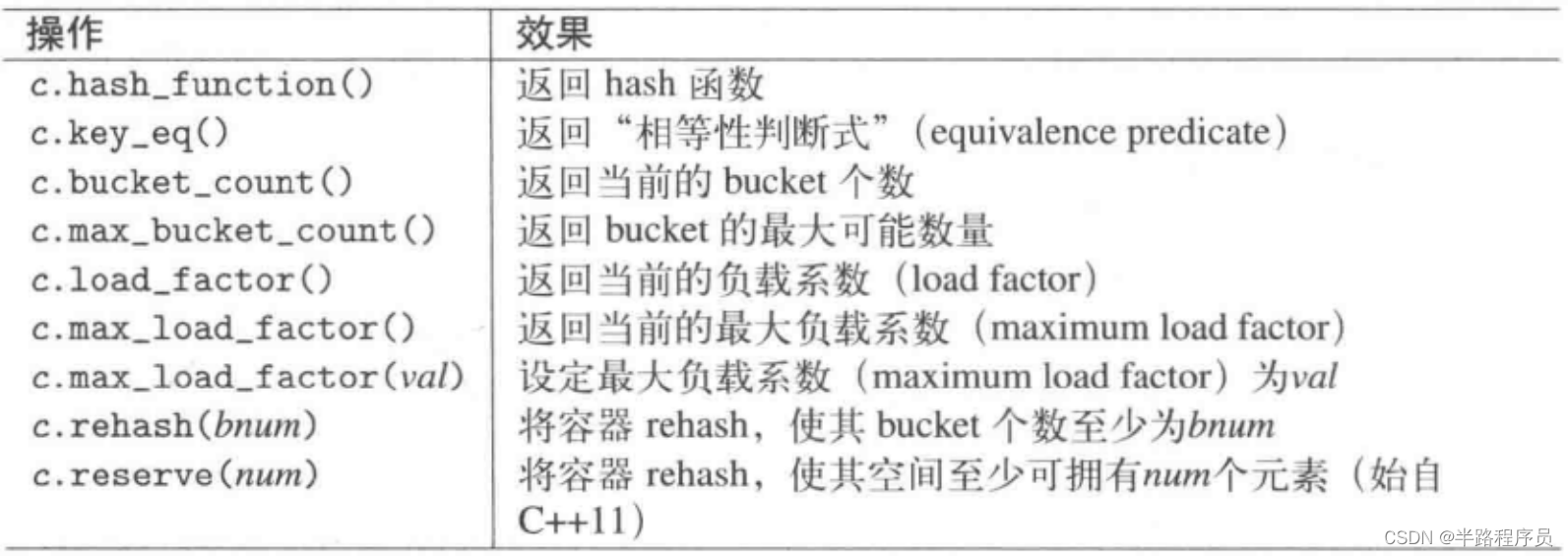
?10、Bucket接口
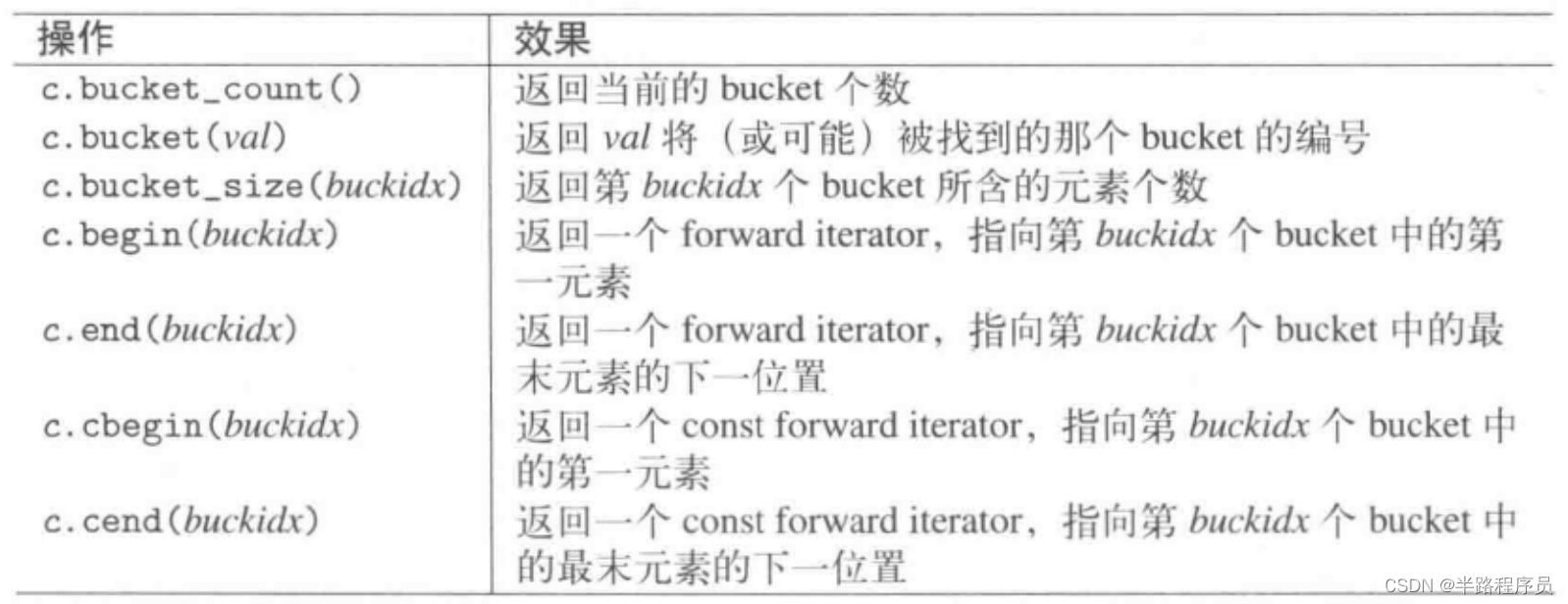
#include <unordered_set>
#include <numeric>
#include "print.hpp"
using namespace std;int main()
{// create and initialize unordered setunordered_set<int> coll = { 1,2,3,5,7,11,13,17,19,77 };// print elements// - elements are in arbitrary orderPRINT_ELEMENTS(coll);// insert some additional elements// - might cause rehashing and create different ordercoll.insert({-7,17,33,-11,17,19,1,13});PRINT_ELEMENTS(coll);// remove element with specific valuecoll.erase(33);// insert sum of all existing valuescoll.insert(accumulate(coll.begin(),coll.end(),0));PRINT_ELEMENTS(coll);// check if value 19 is in the setif (coll.find(19) != coll.end()) {cout << "19 is available" << endl;}// remove all negative valuesunordered_set<int>::iterator pos;for (pos=coll.begin(); pos!= coll.end(); ) {if (*pos < 0) {pos = coll.erase(pos);}else {++pos;}}PRINT_ELEMENTS(coll);
}
輸出:
77 19 17 13 11 7 5 3 2 1
-7 77 19 17 13 11 33 7 -11 5 3 2 1
-7 77 19 17 13 11 137 7 -11 5 3 2 1
19 is available
77 19 17 13 11 137 7 5 3 2 111、提供自己的hash函數和等價準則
//hashval.hpp
#include <functional>// from boost (functional/hash):
// see http://www.boost.org/doc/libs/1_35_0/doc/html/hash/combine.html
template <typename T>
inline void hash_combine (std::size_t& seed, const T& val)
{seed ^= std::hash<T>()(val) + 0x9e3779b9 + (seed<<6) + (seed>>2);
}// auxiliary generic functions to create a hash value using a seed
template <typename T>
inline void hash_val (std::size_t& seed, const T& val)
{hash_combine(seed,val);
}
template <typename T, typename... Types>
inline void hash_val (std::size_t& seed,const T& val, const Types&... args)
{hash_combine(seed,val);hash_val(seed,args...);
}// auxiliary generic function to create a hash value out of a heterogeneous list of arguments
template <typename... Types>
inline std::size_t hash_val (const Types&... args)
{std::size_t seed = 0;hash_val (seed, args...);return seed;
}#include <unordered_set>
#include <string>
#include <iostream>
#include "hashval.hpp"
#include "print.hpp"
using namespace std;class Customer {private:string fname;string lname;long no;public:Customer (const string& fn, const string& ln, long n): fname(fn), lname(ln), no(n) {}friend ostream& operator << (ostream& strm, const Customer& c) {return strm << "[" << c.fname << "," << c.lname << ","<< c.no << "]";}friend class CustomerHash;friend class CustomerEqual;
};class CustomerHash
{public:std::size_t operator() (const Customer& c) const {return hash_val(c.fname,c.lname,c.no);}
};class CustomerEqual
{public:bool operator() (const Customer& c1, const Customer& c2) const {return c1.no == c2.no;}
};int main()
{// unordered set with own hash function and equivalence criterionunordered_set<Customer,CustomerHash,CustomerEqual> custset;custset.insert(Customer("nico","josuttis",42));PRINT_ELEMENTS(custset);}?12、使用Lambda函數作為hash函數和等價準則
#include <iostream>
#include <string>
#include <unordered_set>
#include "hashval.hpp"
#include "print.hpp"using namespace std;class Customer {
private:string fname;string lname;long no;
public:Customer(const string& fn, const string& ln, long n):fname(fn),lname(ln), no(n) {}string firstname() const {return fname;}string lastname() const {return lname;}long number() const {return no;}friend ostream& operator<<(ostream& strm, const Customer&c) {return strm << "[" << c.fname << "," << c.lname << "," << c.no << "]";}
};int main() {auto hash = [](const Customer& c) {return hash_val(c.firstname(), c.lastname(), c.number());};auto eq = [](const Customer& c1, const Customer& c2) {return c1.number() == c2.number();};unordered_set<Customer, decltype(hash), decltype(eq)> custset(10, hash, eq);custset.insert(Customer("noco", "osuttis", 32));PRINT_ELEMENTS(custset);
}注意需要使用decltype產生Lambda類型,作為模板參數,因為Lambda并不存在default構造函數和assignment操作符,因此也必須將Lambda傳遞給構造函數,而由于這兩個是占用第二和第三實參,所以指明第一實參bucket的大小。
13、Bucket接口使用?
?查閱一個unordered容器內部狀態。
#include <iostream>
#include <iomanip>
#include <utility>
#include <iterator>
#include <typeinfo>
#include <unordered_set>template <typename T1, typename T2>
std::ostream& operator << (std::ostream& strm, const std::pair<T1,T2>& p) {return strm << "[" << p.first << "," << p.second << "]";
}template <typename T>
void printHashTableState(const T& cont) {std::cout << "size: " << cont.size() << std::endl;std::cout << "buckets: " << cont.bucket_count() << std::endl;std::cout << "load factor: " << cont.load_factor() << std::endl;std::cout << "max load factor: " << cont.max_load_factor() << std::endl;//迭代器類型if (typeid(typename std::iterator_traits<typename T::iterator>::iterator_category) == typeid(std::bidirectional_iterator_tag)) {std::cout << "chaining style: doubly-linked" << std::endl;} else {std::cout << "chaining style: singly-linked" << std::endl;}// elements per bucketstd::cout << "data: " << std::endl;for (auto idx = 0; idx != cont.bucket_count(); ++idx) {std::cout << " b[" << std::setw(2) << idx << "]: ";for (auto pos = cont.begin(idx); pos != cont.end(idx); ++pos) {std::cout << *pos << " ";}std::cout << std::endl;}std::cout << std::endl;
}int main() {std::unordered_set<int> intset = {1, 2, 3, 4, 5, 7, 11, 13, 17, 18};printHashTableState(intset);intset.insert({-7, 17, 33, 4});printHashTableState(intset);return 0;
}
輸出:
size: 10
buckets: 13
load factor: 0.769231
max load factor: 1
chaining style: singly-linked
data:b[ 0]: 13b[ 1]: 1b[ 2]: 2b[ 3]: 3b[ 4]: 17 4b[ 5]: 18 5b[ 6]:b[ 7]: 7b[ 8]:b[ 9]:b[10]:b[11]: 11b[12]:size: 12
buckets: 13
load factor: 0.923077
max load factor: 1
chaining style: singly-linked
data:b[ 0]: 13b[ 1]: 1b[ 2]: 2b[ 3]: 3b[ 4]: 17 4b[ 5]: 18 5b[ 6]:b[ 7]: 33 7b[ 8]:b[ 9]: -7b[10]:b[11]: 11b[12]:#include <iostream>
#include <iomanip>
#include <utility>
#include <iterator>
#include <typeinfo>
#include <string>
#include <unordered_set>
#include <unordered_map>template <typename T1, typename T2>
std::ostream& operator << (std::ostream& strm, const std::pair<T1,T2>& p) {return strm << "[" << p.first << "," << p.second << "]";
}template <typename T>
void printHashTableState(const T& cont) {std::cout << "size: " << cont.size() << std::endl;std::cout << "buckets: " << cont.bucket_count() << std::endl;std::cout << "load factor: " << cont.load_factor() << std::endl;std::cout << "max load factor: " << cont.max_load_factor() << std::endl;//迭代器類型if (typeid(typename std::iterator_traits<typename T::iterator>::iterator_category) == typeid(std::bidirectional_iterator_tag)) {std::cout << "chaining style: doubly-linked" << std::endl;} else {std::cout << "chaining style: singly-linked" << std::endl;}// elements per bucketstd::cout << "data: " << std::endl;for (auto idx = 0; idx != cont.bucket_count(); ++idx) {std::cout << " b[" << std::setw(2) << idx << "]: ";for (auto pos = cont.begin(idx); pos != cont.end(idx); ++pos) {std::cout << *pos << " ";}std::cout << std::endl;}std::cout << std::endl;
}using namespace std;int main() {// create and initialize an unordered multimap as dictionarystd::unordered_multimap<string,string> dict = {{"day","Tag"},{"strange","fremd"},{"car","Auto"},{"smart","elegant"},{"trait","Merkmal"},{"strange","seltsam"}};printHashTableState(dict);// insert some additional values (might cause rehashing)dict.insert({{"smart","raffiniert"},{"smart","klug"},{"clever","raffiniert"}});printHashTableState(dict);// modify maximum load factor (might cause rehashing)dict.max_load_factor(0.7);printHashTableState(dict);
}
輸出:
size: 6
buckets: 7
load factor: 0.857143
max load factor: 1
chaining style: singly-linked
data:b[ 0]: [trait,Merkmal]b[ 1]: [strange,fremd] [strange,seltsam]b[ 2]: [day,Tag]b[ 3]: [smart,elegant]b[ 4]:b[ 5]: [car,Auto]b[ 6]:size: 9
buckets: 17
load factor: 0.529412
max load factor: 1
chaining style: singly-linked
data:b[ 0]: [car,Auto]b[ 1]:b[ 2]:b[ 3]:b[ 4]: b[ 5]:b[ 6]: [strange,fremd] [strange,seltsam] [smart,elegant] [smart,klug] [smart,raffiniert]b[ 7]:b[ 8]:b[ 9]:b[10]: [clever,raffiniert]b[11]:b[12]: [trait,Merkmal]b[13]:b[14]:b[15]: [day,Tag]b[16]:size: 9
buckets: 17
load factor: 0.529412
max load factor: 0.7
chaining style: singly-linked
data:b[ 0]: [car,Auto]b[ 1]:b[ 2]:b[ 3]:b[ 4]:b[ 5]:b[ 6]: [strange,fremd] [strange,seltsam] [smart,elegant] [smart,klug] [smart,raffiniert]b[ 7]:b[ 8]:b[ 9]:b[10]: [clever,raffiniert]b[11]:b[12]: [trait,Merkmal]b[13]:b[14]:b[15]: [day,Tag]b[16]:)

)


 20)


工程中提示詞的開發優化基礎概念學習總結)
)









 函數 ))